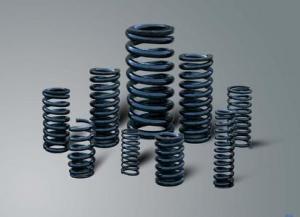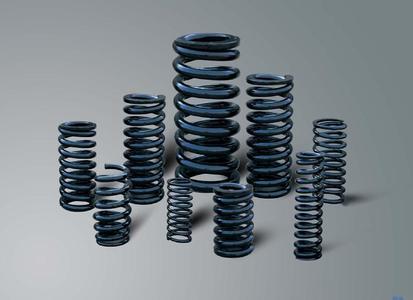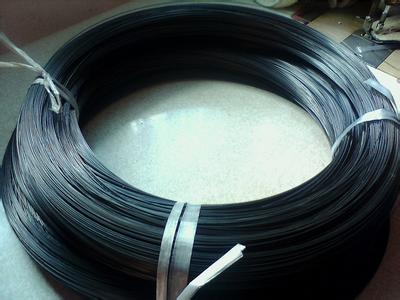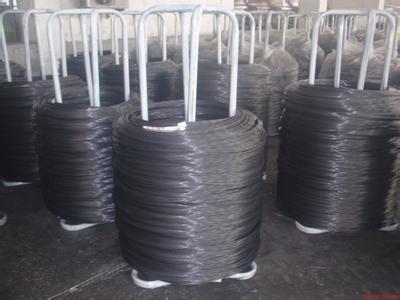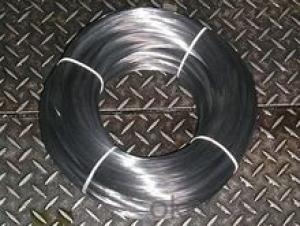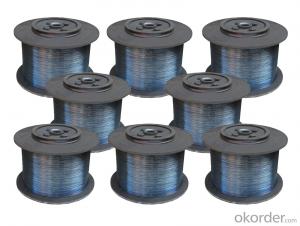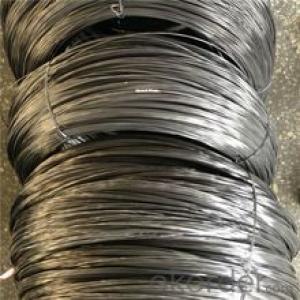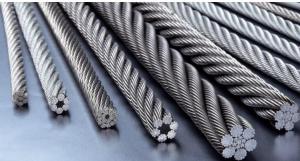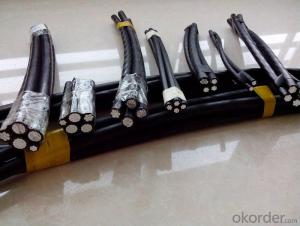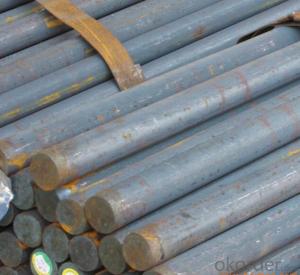High grade spring steel wire
- Loading Port:
- China Main Port
- Payment Terms:
- TT OR LC
- Min Order Qty:
- -
- Supply Capability:
- -
OKorder Service Pledge
OKorder Financial Service
You Might Also Like
Spring steel is due in the quenched and tempered condition of elastic,specially used in the manufacture of spring and spring steel. Resiliencedepends on the deformation of steel in the elasticity, that is within the scope of the regulations, the elastic deformation of the ability to bear a certain load, theload permanent deformation after removal does not appear. Spring steelshould possess excellent comprehensive properties, such as mechanical properties (especially the elastic limit, ultimate strength, yield ratio), sag resistance performance (i.e., anti sagging performance, also known as the anti relaxation property), fatigue performance, hardenability, physical and chemical properties of heat resistance, low temperature resistance, (oxidation, corrosion resistance etc.). In order to meet the performance requirements, spring steel has excellent metallurgical quality (high purity and uniformity), good surface quality (strict control of surface defects and decarburization), shape and sizeprecision.
According to GB/T 13304 "steel classification" standard, according to the basicproperties and use characteristics of spring steel, belonging to the mechanical structure with steel; according to the quality grade, which belongs to thespecial quality steel, which need to be especially strict quality control and performance of the steel in the production process. According to the Chinahabits, spring steel belongs to special steel, spring steel when makingtechnical requirements are relatively high, excellent technology directly determine the level of quality.
Classification
Classified according to chemical composition
According to the GB/T 13304 standard, spring steel for non alloy spring steelin accordance with its chemical composition (carbon spring steel) and alloy spring steel. Carbon spring steel
The carbon content of carbon spring steel (mass fraction) in general 0.62%~0.90%. According to the content of manganese is divided into generalmanganese content (mass fraction) (0.50%~0.80%) such as 65, 70, 85 andhigher manganese content (mass fraction) (0.90~1.20%), such as the 65Mnclass two.
Alloy spring steel
Alloy spring steel in carbon steel on the basis of appropriate, by adding one orseveral kinds of alloy elements to improve the mechanical properties ofhardened steel, permeability and other properties, the desired performance in order to meet the manufacturing all kinds of spring steel.
Alloy spring steel basic composition series, Si Mn spring steel, spring steel,silicon chromium chromium manganese spring steel, chrome vanadium springsteel, tungsten chromium vanadium spring steel etc.. Based on these series,with molybdenum, vanadium and boron alloy elements such as some brandsand join in order to improve the performance of some of its aspects.
In addition, also from other steel types, such as high quality carbon structuralsteel, carbon tool steel, high-speed tool steel, stainless steel, the choice of some grades of steel used as spring.
Classification according to the production processing method
The hot rolling (forging) steel hot rolling round steel, including Fang Gang, flat steel, steel plate, forging round steel, Fang Gang.
The cold drawing (rolling) steel wire, cold drawn steel strip, including material(cold drawn steel).
In accordance with the steel delivery status classification
The hot rolling (forging) steel
A. rolled (forging) delivery of steel after hot forming is made of spring, and then quenching and tempering treatment.
B. in annealing state of delivery by the cold formed steel spring, thenquenching and tempering treatment.
All the above should comply with the relevant state provisions of deliveryhardness.
The cold drawing (rolling) steel
A. steel wire
The lead bath isothermal quenching cold drawn steel wire (also called sendDeng de cold drawing steel wire spring) made only after low temperaturetempering, to eliminate stress.
The oil quenching and tempering steel cold drawn into required size,continuous heating, continuous oil quenching and tempering of lead. Springsteel wire made only for the bottom temperature of fire, in order to eliminate stress.
The cold drawn steel wire (i.e. without quenching and tempering steel)
A. to cold state of delivery.
B. with annealing, normalizing or tempering treatment delivery.
The above two kinds of delivery wire springs are needed after quenching and tempering treatment.
B. steel strip
The cold state of delivery is made of spring after low temperature tempering, to eliminate stress.
The quenched and tempered condition required delivery is made of springafter low temperature tempering, to eliminate stress.
The back fire delivery is made of spring after quenching and temperingtreatment needs
C. cold drawn steel
In the annealed state delivery after cold forming steel is made of spring, and then quenching and tempering treatment.
The other classification method
In addition to the above, there are a number of other classification methods,for example:
According to the conditions of delivery requirements can be divided according to the chemical composition (mechanical properties) delivery and press thehardenability of delivery.
According to the spring working conditions can be divided into static loadspring steel, subjected to impact load spring steel and high (low) temperaturespring and corrosion resistance of spring steel etc..
2 process performance
Edit
Spring in use shock and vibration or prolonged stress, so the requirements ofhigh tensile strength, high elastic limit, the fatigue strength of the spring steel.In the technology requirements of spring steel has certain hardenability, not easy removal, good surface quality carbon spring steel is carbon content of WC in the 0.6%-0.9% range of high-quality carbon structural steel. Alloy springsteel is mainly the Si Mn steel, their carbon content was slightly lower, mainly by increasing the silicon content of Wsi to improve performance; in addition toLuo, tungsten, vanadium alloy steel spring. In recent years, with ChinaResources, and according to the automobile, tractor design requirements of new technologies, develop new steel added boron, niobium, molybdenum and other elements in the Si Mn steel on the basis of the spring is extended service life, improve the quality of the spring.
Performance requirements
Spring in use shock and vibration or prolonged stress, so the requirements ofhigh tensile strength, high elastic limit, the fatigue strength of the spring steel.In the technology requirements of spring steel has certain hardenability, not easy removal, good surface quality carbon spring steel is carbon content of WC in the 0.6%-0.9% range of high-quality carbon structural steel. Alloy springsteel is mainly of Si Mn steel
- Q: What are the main factors affecting the formability of special steel?
- The main factors affecting the formability of special steel include the composition of the steel, its microstructure, temperature, strain rate, and the presence of impurities or defects. These factors influence the ability of the steel to deform without cracking or fracturing during the forming process. Additionally, the mechanical properties, such as the yield strength and ductility, also play a significant role in determining the formability of special steel.
- Q: How does special steel contribute to the waste management industry?
- Special steel contributes to the waste management industry in various ways. Its exceptional strength, durability, and resistance to corrosion make it ideal for manufacturing equipment used in waste management processes. Special steel is extensively used in the construction of waste sorting systems, recycling machinery, and waste containers, ensuring their longevity and reliability. Additionally, special steel can be recycled itself, reducing the environmental impact of waste management operations and promoting sustainability in the industry.
- Q: Can special steel be used in medical applications?
- Yes, special steel can be used in medical applications. Special steel, also known as stainless steel, is widely used in the medical field due to its unique properties and advantages. It is highly resistant to corrosion, which is essential in medical environments where contact with bodily fluids and sterilization processes are common. Additionally, special steel is biocompatible, meaning it does not cause adverse reactions when in contact with human tissues or fluids. This makes it suitable for applications such as surgical instruments, orthopedic implants, dental equipment, and medical devices. The versatility of special steel allows it to be shaped into various forms, ensuring it can be utilized for different medical purposes. Its strength and durability also contribute to its effectiveness in medical applications, providing long-lasting and reliable tools and equipment. Furthermore, special steel can withstand high temperatures, making it suitable for autoclaving and other sterilization methods. Overall, special steel's properties make it a highly suitable material for medical applications, ensuring the safety, efficacy, and durability of medical equipment and devices.
- Q: Can special steel be used for medical applications?
- Yes, special steel can be used for medical applications. It is often used for surgical instruments, implants, and medical devices due to its high strength, corrosion resistance, and biocompatibility properties. Special steel alloys are carefully designed to meet the stringent requirements of the medical industry, ensuring safety, durability, and effectiveness in various medical procedures.
- Q: Can special steel be used in the production of precision instruments?
- Yes, special steel can be used in the production of precision instruments. Special steel, known for its high strength, corrosion resistance, and heat resistance, provides the necessary durability and stability required for precise measurements and operations in precision instruments.
- Q: What are the main environmental impacts of special steel production?
- The main environmental impacts of special steel production include greenhouse gas emissions, air pollution, water pollution, and the depletion of natural resources. The production process involves high energy consumption, which leads to significant carbon dioxide emissions, contributing to climate change. Additionally, the use of various chemicals and additives in the process can result in air pollution, releasing toxic substances and particulate matter into the atmosphere. Moreover, the production generates wastewater and solid waste, which can contaminate water sources if not properly managed. Finally, the extraction and processing of raw materials like iron ore and coal contribute to the depletion of natural resources and habitat destruction. Overall, special steel production poses substantial environmental challenges that need to be addressed for sustainability.
- Q: How does special steel perform in cryogenic applications?
- Special steel is known for its excellent performance in cryogenic applications. Cryogenic temperatures refer to extremely low temperatures below -150 degrees Celsius (-238 degrees Fahrenheit). In such conditions, regular steel tends to become brittle and lose its strength, making it unsuitable for use. However, special steel, also known as cryogenic steel or low-temperature steel, is specifically designed to withstand these extreme cold temperatures. One of the key properties of special steel is its ability to maintain its mechanical properties even at cryogenic temperatures. It retains its strength, toughness, and ductility, ensuring that it can withstand the stresses and strains imposed on it in cryogenic environments. This allows special steel to be used in various applications, such as cryogenic storage tanks, pipelines, and equipment in industries like aerospace, energy, and healthcare. Special steel also exhibits excellent resistance to brittle fracture at low temperatures. This is crucial, as brittle fractures can occur when materials become too brittle and fail under stress. The unique composition and processing of special steel help prevent this, ensuring the integrity and safety of components in cryogenic systems. Moreover, special steel has a low coefficient of thermal expansion, meaning it experiences minimal dimensional changes when exposed to temperature variations. This property is highly advantageous in cryogenic applications, as it helps maintain the stability and reliability of equipment and structures. In addition, special steel offers good corrosion resistance, which is essential in cryogenic environments where the presence of moisture and certain chemicals can accelerate corrosion processes. The resistance to corrosion ensures the longevity and durability of components, reducing maintenance and replacement costs. Overall, special steel is a preferred choice for cryogenic applications due to its ability to maintain mechanical properties, resistance to brittle fracture, low thermal expansion, and corrosion resistance. These properties make it a reliable and efficient material for use in cryogenic systems, providing the necessary strength and durability even in extremely low-temperature conditions.
- Q: What are the properties and characteristics of special steel?
- Special steel refers to a category of steel that has unique properties and characteristics, making it suitable for specific applications that require exceptional strength, durability, and resistance to various environmental factors. Some of the properties and characteristics of special steel include: 1. High Strength: Special steel is known for its exceptional strength, allowing it to withstand heavy loads and extreme conditions. This makes it ideal for applications that require structural integrity and durability, such as construction, automotive, and aerospace industries. 2. Excellent Corrosion Resistance: Special steel is often alloyed with elements like chromium and nickel, which enhance its resistance to corrosion and oxidation. This property makes it highly valuable in environments where exposure to moisture, chemicals, or extreme temperatures may cause conventional steel to deteriorate rapidly. 3. Heat Resistance: Special steel is designed to retain its mechanical properties and structural integrity even at high temperatures. It exhibits excellent thermal stability, which makes it suitable for applications involving intense heat, such as power generation, oil and gas industries, and manufacturing processes. 4. Wear Resistance: Special steel is often hardened and treated to enhance its wear resistance. This property allows it to withstand abrasive materials, friction, and erosion, making it suitable for cutting tools, machine parts, and wear-resistant components in heavy machinery. 5. Magnetic Properties: Certain types of special steel exhibit magnetic properties, which make them ideal for applications in the electrical and electronics industries. Examples include electrical transformers, motors, generators, and magnetic shielding. 6. Machinability: Special steel is designed to be easily machinable, meaning it can be shaped, formed, and fabricated into various components with precision. This property is important for industries that require complex and intricate parts that can be efficiently produced. 7. Cost-effectiveness: Despite its unique properties, special steel is often cost-effective compared to other materials with similar performance characteristics. Its long lifespan, resistance to corrosion and wear, and versatility make it a preferred choice for numerous applications, offering a balance between performance and cost. Overall, special steel combines exceptional strength, resistance to corrosion and wear, heat resistance, and magnetic properties, making it a versatile material used in various industries. Its unique properties make it an essential component in applications where standard steel or other materials would not suffice.
- Q: What are the requirements for special steel used in food processing equipment?
- The requirements for special steel used in food processing equipment include high corrosion resistance to prevent contamination, excellent hygiene and cleanability properties, high strength and durability to withstand heavy usage, and compliance with food safety regulations and standards.
- Q: Can special steel be used in the beverage manufacturing industry?
- Yes, special steel can be used in the beverage manufacturing industry. Special steel, such as stainless steel, is often preferred due to its corrosion resistance, hygienic properties, and durability. It is commonly used in various components of beverage production equipment, including tanks, pipes, valves, and fittings, to ensure the integrity and quality of the final product.
Send your message to us
High grade spring steel wire
- Loading Port:
- China Main Port
- Payment Terms:
- TT OR LC
- Min Order Qty:
- -
- Supply Capability:
- -
OKorder Service Pledge
OKorder Financial Service
Similar products
Hot products
Hot Searches
Related keywords
